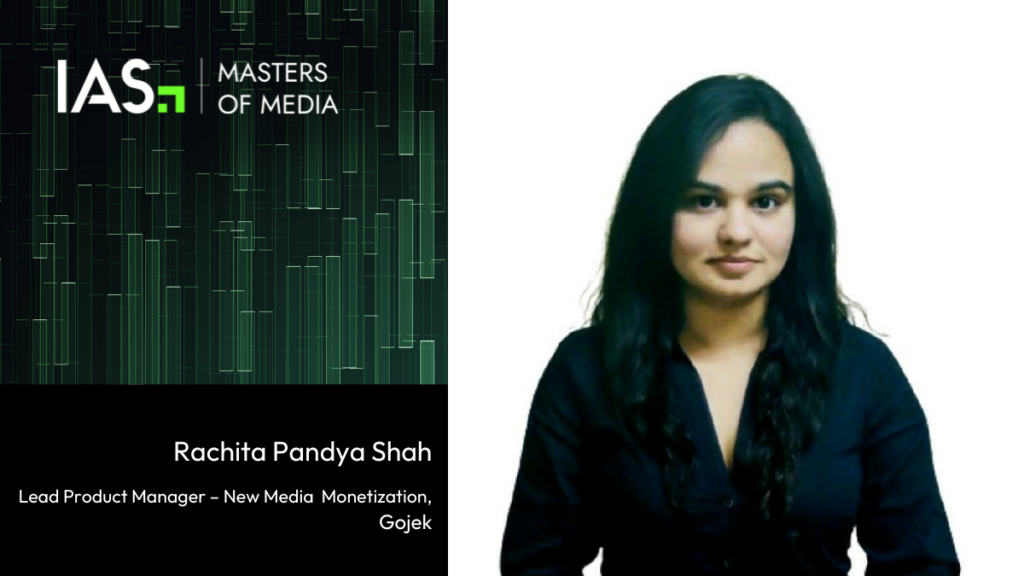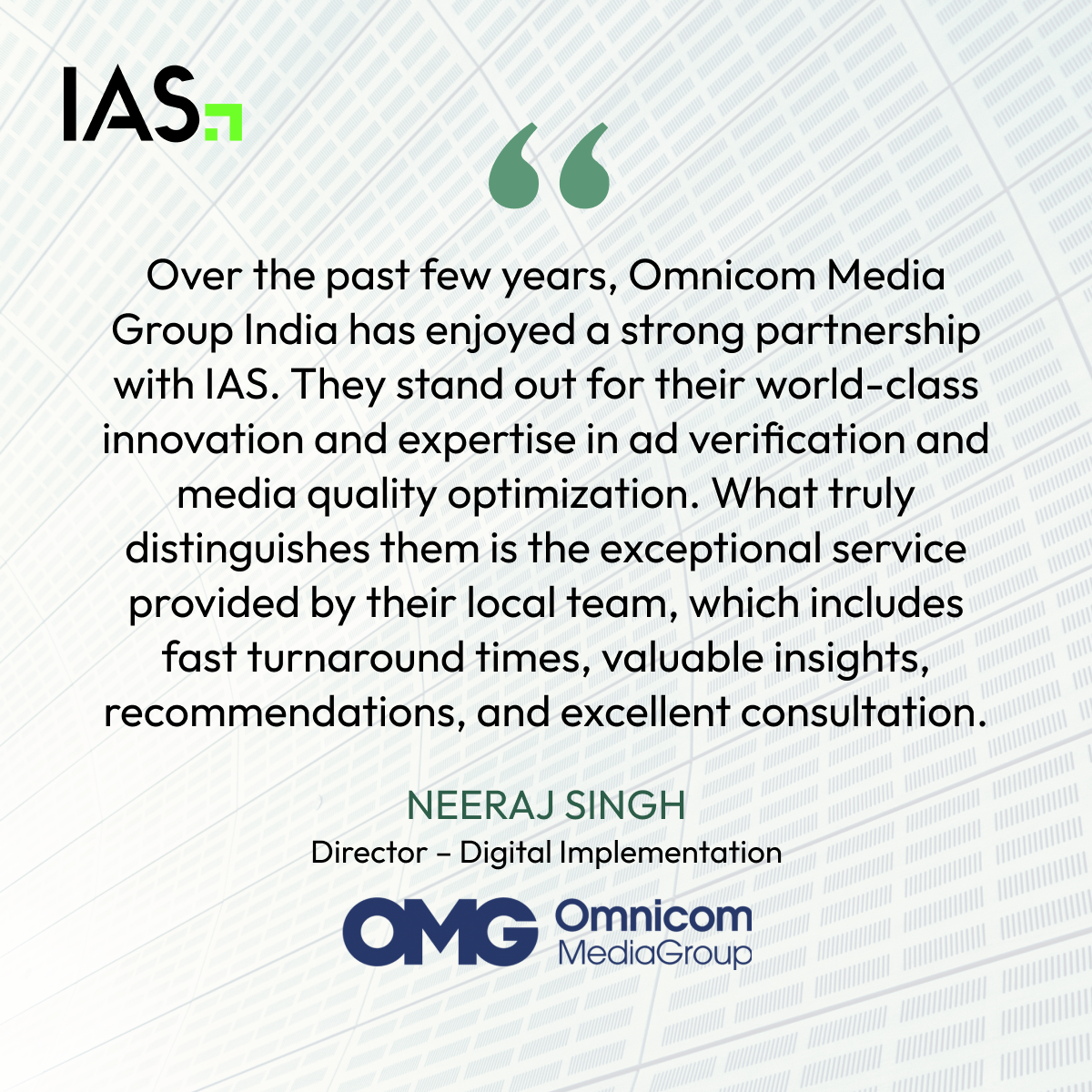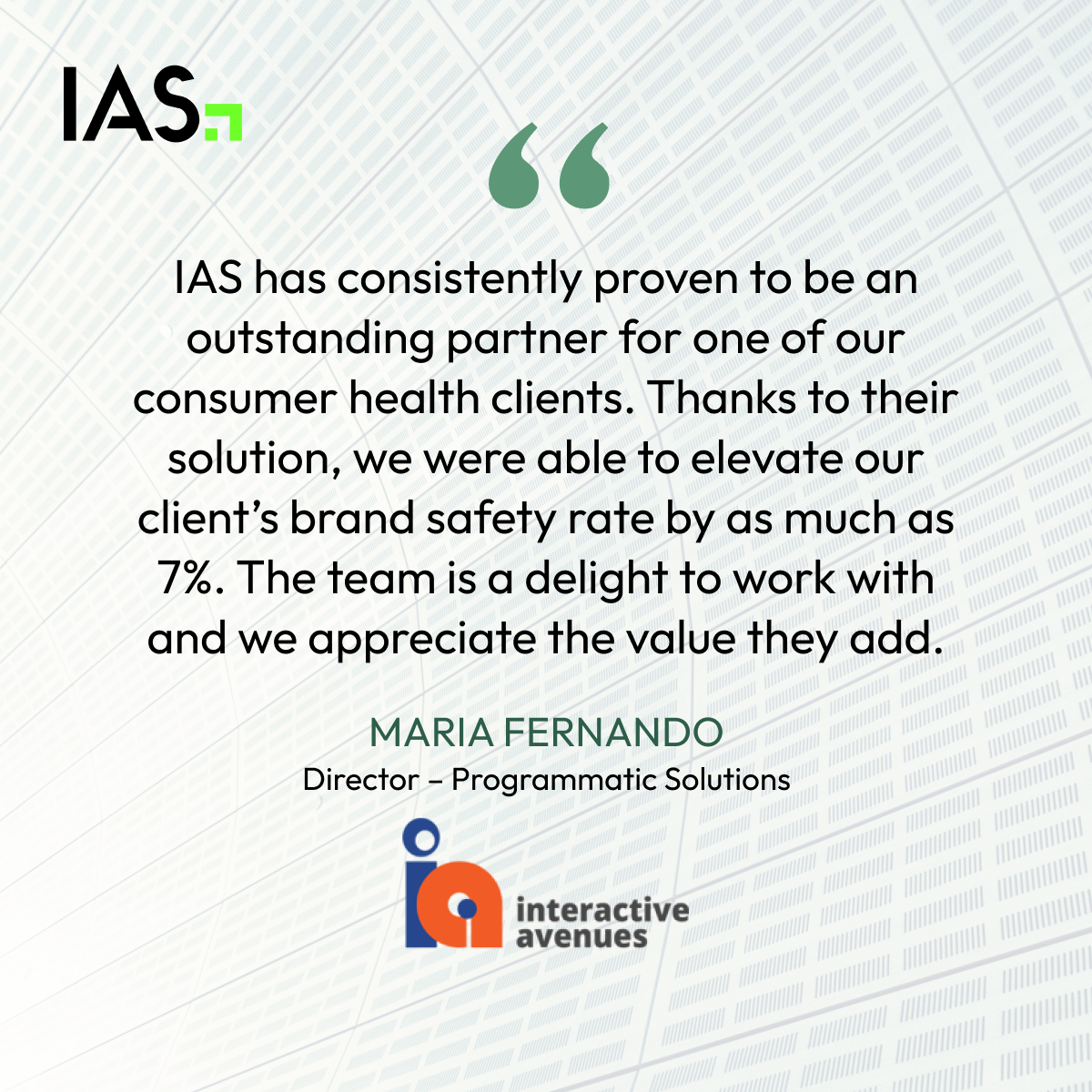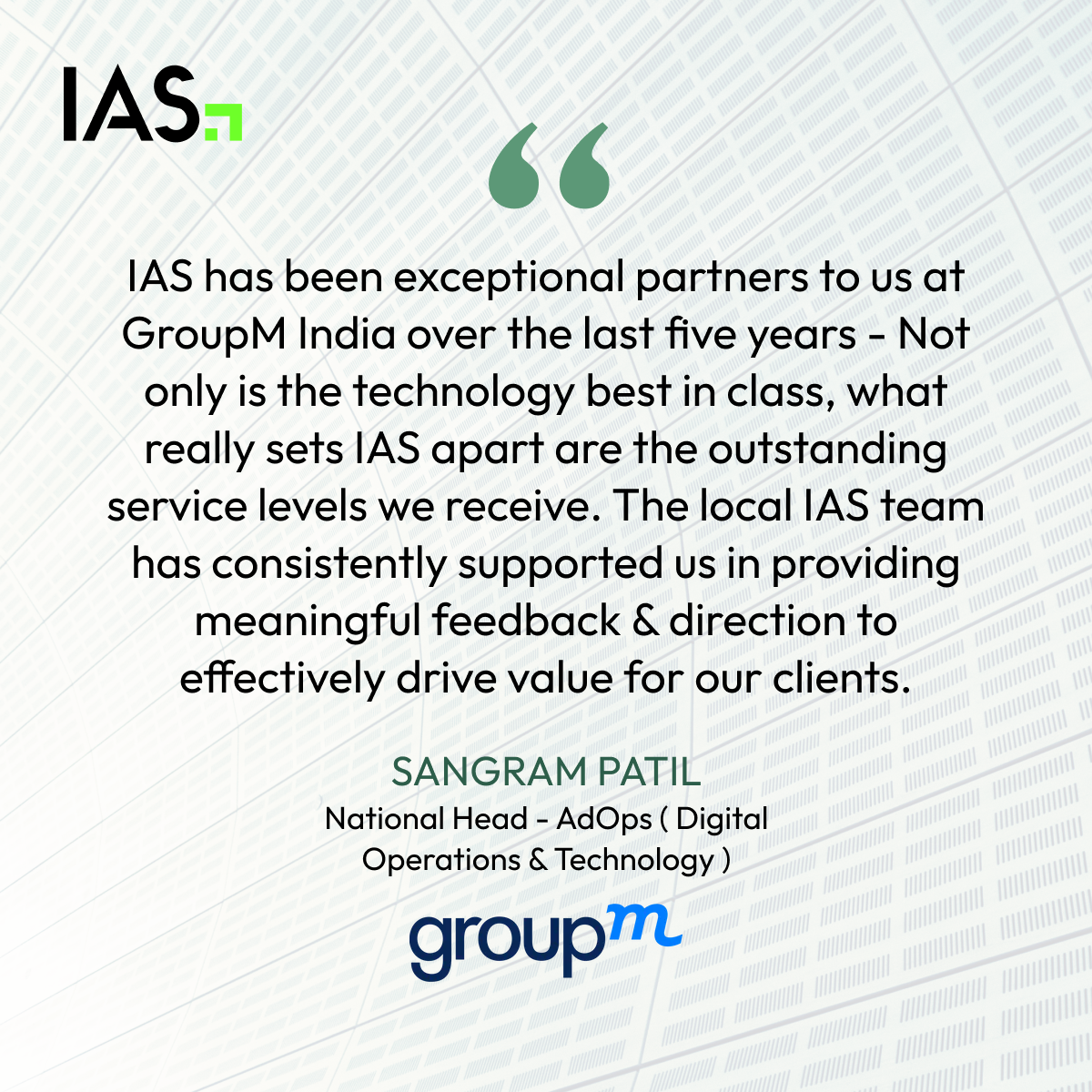
In this exclusive “Masters of Media” series, Integral Ad Science (IAS) speaks to the Movers and Shakers of the Southeast Asia advertising industry, on all matters digital.
Rachita Pandya Shah is the Lead Product Manager – New Media Monetization at Gojek. She has a decade of experience building products in advertising technology and ecommerce. She is currently leading product development of an innovative digital OOH product that is programmatic in nature and empowers advertisers to reach their audience in a safe, measurable and verifiable way.
Integral Ad Science (IAS): Rachita, please tell us about your digital advertising journey and your current role
Rachita: I think it was destiny! I was a super curious kid who was fascinated by ads. The fascination was more around how powerful ads had the ability to form habits, make for a dinner-time conversation and also influence discovery of choices. After over half a decade of building ad-tech products, I continue being a student of consumer behaviour, human psychology and the science behind decision making.
As someone who has had the privilege of working in traditional media companies as well as digital media, I realise that though the medium keeps changing, advertising is a staple. From building platform-ized ad-tech products for advertisers and publishers, to tailor made products for social media marketing and influencer marketing, I have had the good fortune of experiencing the challenges and opportunities of the full spectrum first hand.
What I have observed, is that with each new advent in technology in this space, there appears a dichotomy in the background. If digital media brought advertisers closer to consumers, it also brought upon infringement of privacy. I am passionate about building products that ease this conflict. I love to build products that position ads as delightful content that aids discovery, education and information, and is consumed with consent. And that is what I am doing in my current role as well – exploring new media to engage with consumers in a safe and non-intrusive manner, using technology.
IAS: What were your top learnings during the recent pandemic?
Rachita: Pandemic has changed me in many ways, for the good I would say. It offered an opportunity for multidimensional self-reflection. A lot of my beliefs were challenged, as was done for a vast majority of people, globally. Both personally and professionally, I’ve learnt new skills, formed new habits, and found new interests and hobbies. My top 3 learnings, however would be, to have learnt how to:
- Distil needs from wants: As a people, globally we seem to have developed a new, more clear, more rational method of distilling needs from wants. This reflects in businesses as well. Adoption of virtual workplace in companies that aren’t purely technology companies, is a great example. For me, I learnt that our tolerance window for material needs is much broader than what we give ourselves credit for. Then again, who would have thought I would actually miss commuting to office in the infamous Bengaluru traffic (haha!)
- Never say never: No one expected a pandemic to take charge of the lives of people all around the world. I realised that people, including myself, as well as businesses had a lot of rigid boundaries around what is considered to be “normal”. Those have started to blur their way into being more flexible. Parents who were watchful of the screen time of their kids pre-pandemic are now adapting to full time online schools. People from all age groups and social strata are now hooked on to one or more digital communication tools. Some of these cohorts were perhaps never even considered to be an important enough user group earlier. So, I have learnt to internalise the proverb, never say never. I never thought I could grow capsicums, tomatoes and green chillies in my balcony garden, yet I could and I did 🙂
- Accept that pivot(s) is pivotal: Business models, just as personal lives, have undergone more pivots in this year than perhaps many earlier years put together – 7 years in 7 months, as they say. To pivot, by definition, means to hold firm on the ground at one end and swivel the other end to another spot. Multiple pivots could take one far, far away from the origin. Change management is always tough. It’s only tougher now, given the pace of pivots. Practicing mindfulness has helped me manage this better and with more comfort. I also encourage and empower my team to do so.
IAS: What changes do you expect in spending habits over the holiday season?
Rachita: It will be quite interesting to see the shopping trends this holiday season. While consumers are being cautiously optimistic, there is still a lot of uncertainty that they’re grappling with. Certain categories have seen growth in the past few months – personal and home care, medicines, food and beverages – both online and offline channels have seen growth. On the other hand, tourism, apparel and accessories are some categories where spending saw a significant dip. With the year of pandemic coming to a close, this holiday season, there is hope that spends will see a spurt in categories like general household items, gifting and confectionery. On-demand services and entertainment, online retailers and ecommerce giants are trending towards being more generous in promotions and discounts. Will they be able to cash in on the optimism is something only time will tell.
IAS: Any tips for marketers navigating the new normal in the region?
Rachita: Be empathetic. It is the best time to build relationships with consumers and echo this shared experience that is being felt globally. It’s a great opportunity to model empathy, humanity, authenticity to establish a high level of connectedness.
Be innovative. Focus on new technologies and new media as those will be the game changers. Technologies and media that put user needs first, and empathizes with everyone involved in the ecosystem will likely emerge as the leaders. Early adopters tend to stand a better chance for an early and stronger recovery post-pandemic.
IAS: What are the key initiatives pertaining to digital media quality that are being prioritized currently?
Rachita: Media quality is quite a subjective term. Quality of media cuts across content, delivery mechanism and measurability at the very least. Super short videos of 2-3s are becoming quite popular in digital personal as well as mass media. Content in “stories” format is emerging as one of the most preferred ad formats. Messaging and CTA in this format is seeing innovation as well as quality overhaul. New media like digital OOH and OTT are seeing innovation in content, ad delivery mechanism as well as measurability. Verifiable viewability in digital OOH is another area that has piqued the interest of many. Fraud defense and brand safety continue to be areas of investment from a platform as well publisher stand point to give the needed comfort to advertisers.
IAS: With increasing privacy concerns and guidelines around it, how should advertisers think about reaching consumers.
Rachita: Personalisation and targeting have recently become the flag bearers of violation of user privacy. But those are in fact just one of the many tools to offer a more customized experience to the users. With privacy concerns growing and guidelines around it coming into being globally, advertising technology would have to step up to deliver an non-intrusive yet relevant experience to consumers.
“If it’s free, you’re probably the product” has perhaps been one of the most debated topics in the last few years in ad tech fora. But in my opinion, advertising should not be equated with a sale or an intention to sell. That attaches a negative connotation to the experience. It triggers an innate defense mechanism in the consumer’s mind as well. Instead, if the intent is to only help “discover new products”, or “inform about new services” or “educate about a new technology”, consumers would tend to interact more willingly. Successful billion-dollar companies are built on “recommendations” as their business model. That indicates that users are not averse to information. Rather they seek information relevant to them and respond positively. But they are averse to seemingly “forced information”. I would say now, because of the changes in policies and greater emphasis on user consent, it is a great opportunity to rethink how advertisers and consumers interact with each other in a safe, mutually beneficial and delightful manner.
IAS: What’s your favourite book/podcast/movie and why?
Rachita: I’m currently reading The Age of Surveillance Capitalism by Shoshana Zuboff. I find her statement that “if the digital future is to be our home, then it is we who must make it so” to be incredibly profound. Capitalism of any kind is a double edged sword. With social media and digitization of nearly everything becoming more and more ingrained in the lives of humans, this book serves as an inspiration to strive towards making the best of it in an honorable way.
One of my all time favourite books is A Short History of Nearly Everything by Bill Bryson. It’s a fascinating book about a vast variety of topics – heavy on wit, light on jargon. I had read it growing up, and I vividly remember Bryson’s articulation of the size of the universe as that moment when one experiences humility in the real sense.
I enjoy listening to the Freakonomics Radio – a podcast by Stephen Dubner. Though not a big movie buff, I love the Avengers movies. I allow myself a little indulgence by binge watching “recommended” TV shows on Netflix over the weekend!
IAS: What is your advice to the fresh talent in the industry?
Rachita: Be versatile. Be veracious. Be valiant.
In this world of generalists, more often than not we find ourselves giving a lot of credit to specializations. But in my experience, just the virtue of being versatile and expanding the range of things one can do, goes a long way in nurturing innovative and creative thoughts.
There’s an analogy I had heard once, and I find that it is incredibly relatable. If you are to find yourself feeling awkward or out of place in a generally acceptable space, think of yourself as a swan who is unable to walk gracefully on the ground (a generally acceptable space). The same swan looks as graceful as grace itself when it finds water, by changing nothing in itself. So, find your water.
Entrepreneurs and thought leaders have a lot of grit and conviction that comes of courage. It’s not genetic. Because, after all, only babies are born. Have faith that given patience, dedication and the right pedagogy, everything is learnable. Be valiant in picking the right things to learn.
 Share on LinkedIn
Share on LinkedIn Share on X
Share on X

